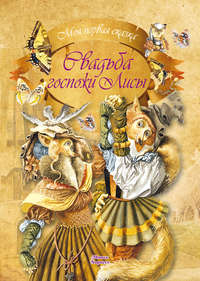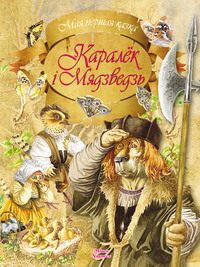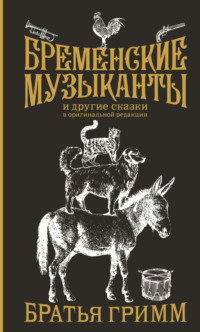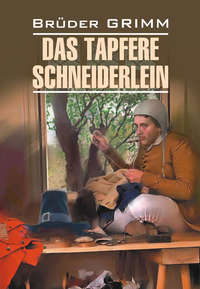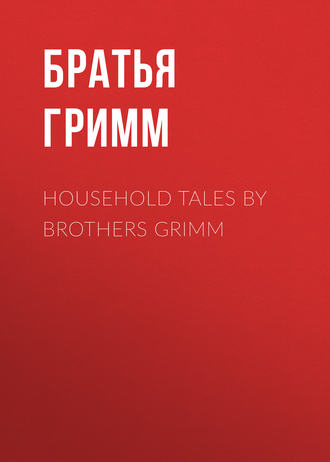 полная версия
полная версияHousehold Tales by Brothers Grimm
Then said he, "I will only give you quite a small blow, that's all." And he raised his foot, and gave him such a kick that he flew away over four loads of hay. Then he sought out the thickest iron bar in the smithy for himself, took it as a stick in his hand and went onwards.
When he had walked for some time, he came to a small farm, and asked the bailiff if he did not require a head-servant. "Yes," said the bailiff, "I can make use of one; you look a strong fellow who can do something, how much a year do you want as wages?" He again replied that he wanted no wages at all, but that every year he would give him three blows, which he must bear. Then the bailiff was satisfied, for he, too, was a covetous fellow. Next morning all the servants were to go into the wood, and the others were already up, but the head-servant was still in bed. Then one of them called to him, "Get up, it is time; we are going into the wood, and thou must go with us." "Ah," said he quite roughly and surlily, "you may just go, then; I shall be back again before any of you." Then the others went to the bailiff, and told him that the head-man was still lying in bed, and would not go into the wood with them. The bailiff said they were to awaken him again, and tell him to harness the horses. The head-man, however, said as before, "Just go there, I shall be back again before any of you." And then he stayed in bed two hours longer. At length he arose from the feathers, but first he got himself two bushels of peas from the loft, made himself some broth with them, ate it at his leisure, and when that was done, went and harnessed the horses, and drove into the wood. Not far from the wood was a ravine through which he had to pass, so he first drove the horses on, and then stopped them, and went behind the cart, took trees and brushwood, and made a great barricade, so that no horse could get through. When he was entering the wood, the others were just driving out of it with their loaded carts to go home; then said he to them, "Drive on, I will still get home before you do." He did not drive far into the wood, but at once tore two of the very largest trees of all out of the earth, threw them on his cart, and turned round. When he came to the barricade, the others were still standing there, not able to get through. "Don't you see," said he, "that if you had stayed with me, you would have got home just as quickly, and would have had another hour's sleep?" He now wanted to drive on, but his horses could not work their way through, so he unharnessed them, laid them on the top of the cart, took the shafts in his own hands, and pulled it all through, and he did this just as easily as if it had been laden with feathers. When he was over, he said to the others, "There, you see, I have got over quicker than you," and drove on, and the others had to stay where they were. In the yard, however, he took a tree in his hand, showed it to the bailiff, and said, "Isn't that a fine bundle of wood?" Then said the bailiff to his wife, "The servant is a good one, if he does sleep long, he is still home before the others." So he served the bailiff for a year, and when that was over, and the other servants were getting their wages, he said it was time for him to take his too. The bailiff, however, was afraid of the blows which he was to receive, and earnestly entreated him to excuse him from having them; for rather than that, he himself would be head-servant, and the youth should be bailiff. "No," said he, "I will not be a bailiff, I am head-servant, and will remain so, but I will administer that which we agreed on." The bailiff was willing to give him whatsoever he demanded, but it was of no use, the head-servant said no to everything. Then the bailiff did not know what to do, and begged for a fortnight's delay, for he wanted to find some way of escape. The head-servant consented to this delay. The bailiff summoned all his clerks together, and they were to think the matter over, and give him advice. The clerks pondered for a long time, but at last they said that no one was sure of his life with the head-servant, for he could kill a man as easily as a midge, and that the bailiff ought to make him get into the well and clean it, and when he was down below, they would roll up one of the mill-stones which was lying there, and throw it on his head; and then he would never return to daylight. The advice pleased the bailiff, and the head-servant was quite willing to go down the well. When he was standing down below at the bottom, they rolled down the largest mill-stone and thought they had broken his skull, but he cried, "Chase away those hens from the well, they are scratching in the sand up there, and throwing the grains into my eyes, so that I can't see." So the bailiff cried, "Sh-sh," and pretended to frighten the hens away. When the head-servant had finished his work, he climbed up and said, "Just look what a beautiful neck-tie I have on," and behold it was the mill-stone which he was wearing round his neck. The head-servant now wanted to take his reward, but the bailiff again begged for a fortnight's delay. The clerks met together and advised him to send the head-servant to the haunted mill to grind corn by night, for from thence as yet no man had ever returned in the morning alive. The proposal pleased the bailiff, he called the head-servant that very evening, and ordered him to take eight bushels of corn to the mill, and grind it that night, for it was wanted. So the head-servant went to the loft, and put two bushels in his right pocket, and two in his left, and took four in a wallet, half on his back, and half on his breast, and thus laden went to the haunted mill. The miller told him that he could grind there very well by day, but not by night, for the mill was haunted, and that up to the present time whosoever had gone into it at night had been found in the morning lying dead inside. He said, "I will manage it, just you go away to bed." Then he went into the mill, and poured out the corn. About eleven o'clock he went into the miller's room, and sat down on the bench. When he had sat there a while, a door suddenly opened, and a large table came in, and on the table, wine and roasted meats placed themselves, and much good food besides, but everything came of itself, for no one was there to carry it. After this the chairs pushed themselves up, but no people came, until all at once he beheld fingers, which handled knives and forks, and laid food on the plates, but with this exception he saw nothing. As he was hungry, and saw the food, he, too, place himself at the table, ate with those who were eating and enjoyed it. When he had had enough, and the others also had quite emptied their dishes, he distinctly heard all the candles being suddenly snuffed out, and as it was now pitch dark, he felt something like a box on the ear. Then he said, "If anything of that kind comes again, I shall strike out in return." And when he had received a second box on the ear, he, too struck out. And so it continued the whole night. He took nothing without returning it, but repaid everything with interest, and did not lay about him in vain. At daybreak, however, everything ceased. When the miller had got up, he wanted to look after him, and wondered if he were still alive. Then the youth said, "I have eaten my fill, have received some boxes on the ears, but I have given some in return." The miller rejoiced, and said that the mill was now released from the spell, and wanted to give him much money as a reward. But he said, "Money, I will not have, I have enough of it." So he took his meal on his back, went home, and told the bailiff that he had done what he had been told to do, and would now have the reward agreed on. When the bailiff heard that, he was seriously alarmed and quite beside himself; he walked backwards and forwards in the room, and drops of perspiration ran down from his forehead. Then he opened the window to get some fresh air, but before he was aware, the head-servant had given him such a kick that he flew through the window out into the air, and so far away that no one ever saw him again. Then said the head-servant to the bailiff's wife, "If he does not come back, you must take the other blow." She cried, "No, no I cannot bear it," and opened the other window, because drops of perspiration were running down her forehead. Then he gave her such a kick that she, too, flew out, and as she was lighter she went much higher than her husband. Her husband cried, "Do come to me," but she replied, "Come thou to me, I cannot come to thee." And they hovered about there in the air, and could not get to each other, and whether they are still hovering about, or not, I do not know, but the young giant took up his iron bar, and went on his way.
91 The Gnome
There was once upon a time a rich King who had three daughters, who daily went to walk in the palace garden, and the King was a great lover of all kinds of fine trees, but there was one for which he had such an affection, that if anyone gathered an apple from it he wished him a hundred fathoms underground. And when harvest time came, the apples on this tree were all as red as blood. The three daughters went every day beneath the tree, and looked to see if the wind had not blown down an apple, but they never by any chance found one, and the tree was so loaded with them that it was almost breaking, and the branches hung down to the ground. Then the King's youngest child had a great desire for an apple, and said to her sisters, "Our father loves us far too much to wish us underground, it is my belief that he would only do that to people who were strangers." And while she was speaking, the child plucked off quite a large apple, and ran to her sisters, saying, "Just taste, my dear little sisters, for never in my life have I tasted anything so delightful." Then the two other sisters also ate some of the apple, whereupon all three sank deep down into the earth, where they could hear no cock crow.
When mid-day came, the King wished to call them to come to dinner, but they were nowhere to be found. He sought them everywhere in the palace and garden, but could not find them. Then he was much troubled, and made known to the whole land that whosoever brought his daughters back again should have one of them to wife. Hereupon so many young men went about the country in search, that there was no counting them, for every one loved the three children because they were so kind to all, and so fair of face. Three young huntsmen also went out, and when they had travelled about for eight days, they arrived at a great castle, in which were beautiful apartments, and in one room a table was laid on which were delicate dishes which were still so warm that they were smoking, but in the whole of the castle no human being was either to be seen or heard. They waited there for half a day, and the food still remained warm and smoking, and at length they were so hungry that they sat down and ate, and agreed with each other that they would stay and live in that castle, and that one of them, who should be chosen by casting lots, should remain in the house, and the two others seek the King's daughters. They cast lots, and the lot fell on the eldest; so next day the two younger went out to seek, and the eldest had to stay home. At mid-day came a small, small mannikin and begged for a piece of bread, then the huntsman took the bread which he had found there, and cut a round off the loaf and was about to give it to him, but whilst he was giving it to the mannikin, the latter let it fall, and asked the huntsman to be so good as to give him that piece again. The huntsman was about to do so and stooped, on which the mannikin took a stick, seized him by the hair, and gave him a good beating. Next day, the second stayed at home, and he fared no better. When the two others returned in the evening, the eldest said, "Well, how have you got on?"
"Oh, very badly," said he, and then they lamented their misfortune together, but they said nothing about it to the youngest, for they did not like him at all, and always called him Stupid Hans, because he did not exactly belong to the forest. On the third day, the youngest stayed at home, and again the little mannikin came and begged for a piece of bread. When the youth gave it to him, the elf let it fall as before, and asked him to be so good as to give him that piece again. Then said Hans to the little mannikin, "What! canst thou not pick up that piece thyself? If thou wilt not take as much trouble as that for thy daily bread, thou dost not deserve to have it." Then the mannikin grew very angry and said he was to do it, but the huntsman would not, and took my dear mannikin, and gave him a thorough beating. Then the mannikin screamed terribly, and cried, "Stop, stop, and let me go, and I will tell thee where the King's daughters are." When Hans heard that, he left off beating him and the mannikin told him that he was an earth mannikin, and that there were more than a thousand like him, and that if he would go with him he would show him where the King's daughters were. Then he showed him a deep well, but there was no water in it. And the elf said that he knew well that the companions Hans had with him did not intend to deal honourably with him, therefore if he wished to deliver the King's children, he must do it alone. The two other brothers would also be very glad to recover the King's daughters, but they did not want to have any trouble or danger. Hans was therefore to take a large basket, and he must seat himself in it with his hanger and a bell, and be let down. Below were three rooms, and in each of them was a princess, with a many-headed dragon, whose heads she was to comb and trim, but he must cut them off. And having said all this, the elf vanished. When it was evening the two brothers came and asked how he had got on, and he said, "pretty well so far," and that he had seen no one except at mid-day when a little mannikin had come and begged for a piece of bread, that he had given some to him, but that the mannikin had let it fall and had asked him to pick it up again; but as he did not choose to do that, the elf had begun to lose his temper, and that he had done what he ought not, and had given the elf a beating, on which he had told him where the King's daughters were. Then the two were so angry at this that they grew green and yellow. Next morning they went to the well together, and drew lots who should first seat himself in the basket, and again the lot fell on the eldest, and he was to seat himself in it, and take the bell with him. Then he said, "If I ring, you must draw me up again immediately." When he had gone down for a short distance, he rang, and they at once drew him up again. Then the second seated himself in the basket, but he did just the same as the first, and then it was the turn of the youngest, but he let himself be lowered quite to the bottom. When he had got out of the basket, he took his hanger, and went and stood outside the first door and listened, and heard the dragon snoring quite loudly. He opened the door slowly, and one of the princesses was sitting there, and had nine dragon's heads lying upon her lap, and was combing them. Then he took his hanger and hewed at them, and the nine fell off. The princess sprang up, threw her arms round his neck, embraced and kissed him repeatedly, and took her stomacher, which was made of pure gold, and hung it round his neck. Then he went to the second princess, who had a dragon with five heads to comb, and delivered her also, and to the youngest, who had a dragon with four heads, he went likewise. And they all rejoiced, and embraced him and kissed him without stopping. Then he rang very loud, so that those above heard him, and he placed the princesses one after the other in the basket, and had them all drawn up, but when it came to his own turn he remembered the words of the elf, who had told him that his comrades did not mean well by him. So he took a great stone which was lying there, and placed it in the basket, and when it was about half way up, his false brothers above cut the rope, so that the basket with the stone fell to the ground, and they thought that he was dead, and ran away with the three princesses, making them promise to tell their father that it was they who had delivered them, and then they went to the King, and each demanded a princess in marriage.
In the meantime the youngest huntsman was wandering about the three chambers in great trouble, fully expecting to have to end his days there, when he saw, hanging on the wall, a flute; then said he, "Why dost thou hang there, no one can be merry here?" He looked at the dragons, heads likewise and said, "You too cannot help me now." He walked backwards and forwards for such a long time that he made the surface of the ground quite smooth. But at last other thoughts came to his mind, and he took the flute from the wall, and played a few notes on it, and suddenly a number of elves appeared, and with every note that he sounded one more came. Then he played until the room was entirely filled. They all asked what he desired, so he said he wished to get above ground back to daylight, on which they seized him by every hair that grew on his head, and thus they flew with him onto the earth again. When he was above ground, he at once went to the King's palace, just as the wedding of one princess was about to be celebrated, and he went to the room where the King and his three daughters were. When the princesses saw him they fainted. Hereupon the King was angry, and ordered him to be put in prison at once, because he thought he must have done some injury to the children. When the princesses came to themselves, however, they entreated the King to set him free again. The King asked why, and they said that they were not allowed to tell that, but their father said that they were to tell it to the stove. And he went out, listened at the door, and heard everything. Then he caused the two brothers to be hanged on the gallows, and to the third he gave his youngest daughter, and on that occasion I wore a pair of glass shoes, and I struck them against a stone, and they said, "Klink," and were broken.
92 The King of the Golden Mountain
There was a certain merchant who had two children, a boy and a girl; they were both young, and could not walk. And two richly-laden ships of his sailed forth to sea with all his property on board, and just as he was expecting to win much money by them, news came that they had gone to the bottom, and now instead of being a rich man he was a poor one, and had nothing left but one field outside the town. In order to drive his misfortune a little out of his thoughts, he went out to this field, and as he was walking forwards and backwards in it, a little black mannikin stood suddenly by his side, and asked why he was so sad, and what he was taking so much to heart. Then said the merchant, "If thou couldst help me I would willingly tell thee." "Who knows?" replied the black dwarf. "Perhaps, I can help thee." Then the merchant told him that all he possessed had gone to the bottom of the sea, and that he had nothing left but this field. "Do not trouble thyself," said the dwarf. "If thou wilt promise to give me the first thing that rubs itself against thy leg when thou art at home again, and to bring it here to this place in twelve years' time, thou shalt have as much money as thou wilt." The merchant thought, "What can that be but my dog?" and did not remember his little boy, so he said yes, gave the black man a written and sealed promise, and went home.
When he reached home, his little boy was so delighted that he held by a bench, tottered up to him and seized him fast by the legs. The father was shocked, for he remembered his promise, and now knew what he had pledged himself to do; as however, he still found no money in his chest, he thought the dwarf had only been jesting. A month afterwards he went up to the garret, intending to gather together some old tin and to sell it, and saw a great heap of money lying. Then he was happy again, made purchases, became a greater merchant than before, and felt that this world was well-governed. In the meantime the boy grew tall, and at the same time sharp and clever. But the nearer the twelfth year approached the more anxious grew the merchant, so that his distress might be seen in his face. One day his son asked what ailed him, but the father would not say. The boy, however, persisted so long, that at last he told him that without being aware of what he was doing, he had promised him to a black dwarf, and had received much money for doing so. He said likewise that he had set his hand and seal to this, and that now when twelve years had gone by he would have to give him up. Then said the son, "Oh, father, do not be uneasy, all will go well. The black man has no power over me." The son had himself blessed by the priest, and when the time came, father and son went together to the field, and the son made a circle and placed himself inside it with his father. Then came the black dwarf and said to the old man, "Hast thou brought with thee that which thou hast promised me?" He was silent, but the son asked, "What dost thou want here?" Then said the black dwarf, "I have to speak with thy father, and not with thee." The son replied, "Thou hast betrayed and misled my father, give back the writing." "No," said the black dwarf, "I will not give up my rights." They spoke together for a long time after this, but at last they agreed that the son, as he did not belong to the enemy of mankind, nor yet to his father, should seat himself in a small boat, which should lie on water which was flowing away from them, and that the father should push it off with his own foot, and then the son should remain given up to the water. So he took leave of his father, placed himself in a little boat, and the father had to push it off with his own foot. The boat capsized so that the keel was uppermost, and the father believed his son was lost, and went home and mourned for him.
The boat, however, did not sink, but floated quietly away, and the boy sat safely inside it, and it floated thus for a long time, until at last it stopped by an unknown shore. Then he landed and saw a beautiful castle before him, and set out to go to it. But when he entered it, he found that it was bewitched. He went through every room, but all were empty until he reached the last, where a snake lay coiled in a ring. The snake, however, was an enchanted maiden, who rejoiced to see him, and said, "Hast thou come, oh, my deliverer? I have already waited twelve years for thee; this kingdom is bewitched, and thou must set it free." "How can I do that?" he inquired. "To-night come twelve black men, covered with chains who will ask what thou art doing here; keep silent; give them no answer, and let them do what they will with thee; they will torment thee, beat thee, stab thee; let everything pass, only do not speak; at twelve o'clock, they must go away again. On the second night twelve others will come; on the third, four-and-twenty, who will cut off thy head, but at twelve o'clock their power will be over, and then if thou hast endured all, and hast not spoken the slightest word, I shall be released. I will come to thee, and will have, in a bottle, some of the water of life. I will rub thee with that, and then thou wilt come to life again, and be as healthy as before." Then said he, "I will gladly set thee free." And everything happened just as she had said; the black men could not force a single word from him, and on the third night the snake became a beautiful princess, who came with the water of life and brought him back to life again. So she threw herself into his arms and kissed him, and there was joy and gladness in the whole castle. After this their marriage was celebrated, and he was King of the Golden Mountain.
They lived very happily together, and the Queen bore a fine boy. Eight years had already gone by, when the King bethought him of his father; his heart was moved, and he wished to visit him. The Queen, however, would not let him go away, and said, "I know beforehand that it will cause my unhappiness;" but he suffered her to have no rest until she consented. At their parting she gave him a wishing-ring, and said, "Take this ring and put it on thy finger, and then thou wilt immediately be transported whithersoever thou wouldst be, only thou must promise me not to use it in wishing me away from this place and with thy father." That he promised her, put the ring on his finger, and wished himself at home, just outside the town where his father lived. Instantly he found himself there, and made for the town, but when he came to the gate, the sentries would not let him in, because he wore such strange and yet such rich and magnificent clothing. Then he went to a hill where a shepherd was watching his sheep, changed clothes with him, put on his old shepherd's-coat, and then entered the town without hindrance. When he came to his father, he made himself known to him, but he did not at all believe that the shepherd was his son, and said he certainly had had a son, but that he was dead long ago; however, as he saw he was a poor, needy shepherd, he would give him something to eat. Then the shepherd said to his parents, "I am verily your son. Do you know of no mark on my body by which you could recognize me?" "Yes," said his mother, "our son had a raspberry mark under his right arm." He slipped back his shirt, and they saw the raspberry under his right arm, and no longer doubted that he was their son. Then he told them that he was King of the Golden Mountain, and a king's daughter was his wife, and that they had a fine son of seven years old. Then said the father, "That is certainly not true; it is a fine kind of a king who goes about in a ragged shepherd's-coat." On this the son fell in a passion, and without thinking of his promise, turned his ring round, and wished both his wife and child with him. They were there in a second, but the Queen wept, and reproached him, and said that he had broken his word, and had brought misfortune upon her. He said, "I have done it thoughtlessly, and not with evil intention," and tried to calm her, and she pretended to believe this; but she had mischief in her mind.


